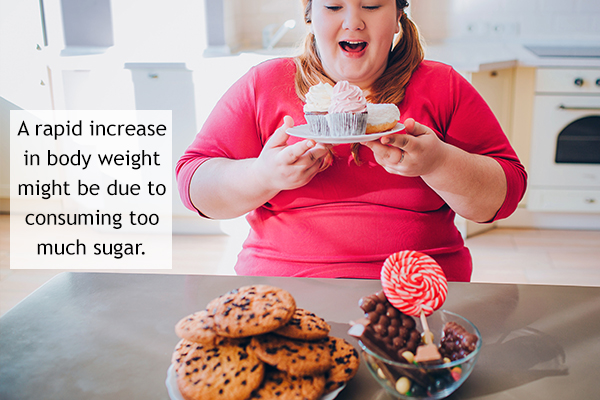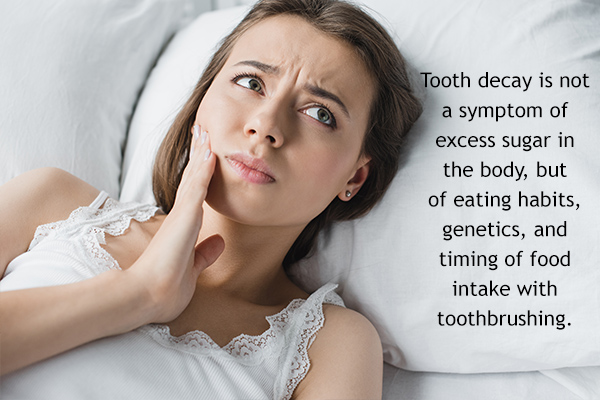In this article:
The food you eat falls into three main (macro) categories: a protein, a carbohydrate, a fat, or a mixture of these. At the end of a meal, anything that’s a carbohydrate will eventually get digested or broken down into simple sugar.

Anytime you read the word “sugar,” understand that it comes not just from sweet foods but from many sources, including:
- Salty snacks, such as pretzels, chips, and crackers
- Grains, such as rice, oats, wheat, and even quinoa
- Any fruit, whether it’s a ripe plantain or a green one
- Starchy vegetables, such as potatoes, corn, and yuca
- Any kind of pea or bean
- A lot of processed foods, such as cereal, bread, and pasta
The Harmful Effects of Excessive Sugar Intake
When the body takes in more sugar than it can handle, a lot of damage can result. It is taxing on the pancreas, increases the amount of insulin released, and puts a strain on the cardiovascular system.
Consuming excess sugar can eventually lead to the following health problems:
- Frequent illness due to low immunity
- Cardiovascular ailments
- Acne and other skin problems
- Undue weight gain
- Generalized fatigue or low energy levels
- Type 2 diabetes
- Memory problems
- Compromised liver function
- Fatty liver disease
- High blood pressure
- High triglycerides
- Poor oral health
- Mood swings (1)(2)
Uncontrolled blood sugar can be extremely dangerous in the long run. It can damage nerves and blood vessels over time, which can lead to loss of sensation in the feet and compromised eyesight.
Signs That You Are Eating Too Much Sugar

It can be very tricky to know when you’re consuming excess sugar. The body is an amazing machine that does its best to keep you in balance until it cannot any longer.
The pancreas will continue to produce enough insulin for as long as it can so that you don’t have a high amount of sugar in your blood. It is for this reason that most people will not know they are eating too much sugar by looking at their lab work.
However, here are a few signs that can alert you to this problem:
- You might be surprised to know that excess sugar can manifest on the body in the form of skin tags and a subtle darkening of the skin called acanthosis nigricans, which can be seen in the folds of the arms, armpits, neck, groin, or forehead.
- A subtle sign that a meal has too much carbohydrate (or sugar) in it is if you want to take a nap immediately after eating.
- A rapid increase in body weight might be due to consuming too much sugar.
- Moreover, if blood sugar levels are constantly elevated, it will cause increased thirst and an increase in urination.
ALSO READ: Signs That You Are Eating Too Much Sugar
The Role of Sugar Intake in Weight Gain
Sometimes, but not always! Weight gain can be the result of many different causes, so it’s not accurate to say that it only comes from a diet high in sugar. Sometimes, it’s not even due to a person’s diet at all.
A high-carbohydrate diet could lead to weight gain if someone is having difficulty metabolizing that sugar (defined as insulin resistance) and is gaining weight despite limiting his or her caloric intake. (3)
The mechanism is complex, but the body wants to clear excess sugar out of the bloodstream, and when it cannot do so, it will store it as fat instead. This is where working with a registered dietitian along with seeing your primary care doctor can help figure out what might be the cause of your weight gain.
Is Tooth Decay Only Caused by Sugary Foods?

Not necessarily. Regular dental hygiene is of extreme importance in preventing tooth decay, but sugar is responsible for the damage done to the teeth.
Crunchy foods such as pretzels, chips, crackers, and cookies can cling onto the surfaces of the teeth long after you’ve eaten the snack. They are capable of causing more damage the longer they’re allowed to sit undisturbed on your teeth.
Someone who consumes a lot of sodas or juices, where the sticky liquid is allowed to bathe the teeth in sugar, can also speed up tooth decay. Tooth decay is, therefore, not a symptom of excess sugar in the body, but of eating habits, genetics, and timing of food intake with toothbrushing.
Can Exercise Undo the Damage Caused by Excess Sugar?
Exercising will help mitigate the health consequences of a diet high in sugar, but it will be ineffective if you don’t simultaneously limit your intake. (4)
Unfortunately, there is no way to outsmart Mother Nature. In my practice, I counsel clients that 80% of the changes they want for their health are based on what they eat, and only 20% comes from exercise.
This holds true for blood sugar control or weight loss. A couple of bites of a rich dessert take only a moment, while it takes a significant amount of time to burn it off.
The Best Way to Flush Out Excess Sugar From the Body
While there is no way to “flush” out excess sugar, taking a walk or doing any exercise after eating a lot of carbohydrates lets the body use that excess fuel instead of storing it as fat or letting it remain in the bloodstream.
Should People With High Blood Pressure Avoid High-Sugar Foods?

It’s helpful for everyone to limit sugary products. People with high blood pressure don’t need to avoid them, but like most things in life, following a protocol of moderation goes a long way. It’s all about balance, portion size, and eating less processed foods, which are helpful to everybody.
Final Word
My top tips to keep sugar in balance in the diet and in the body would be to enjoy foods in the least processed form as you can, the way it’s found in nature. A balanced plate during meals is more important than a list of specific foods to eat or avoid.
Make sure you keep carbohydrates to a size no larger than your fist, a quarter of your plate a protein, and half your plate full of vegetables, and you’ll start to eat and feel better!
- Was this article helpful?
- YES, THANKS!NOT REALLY


